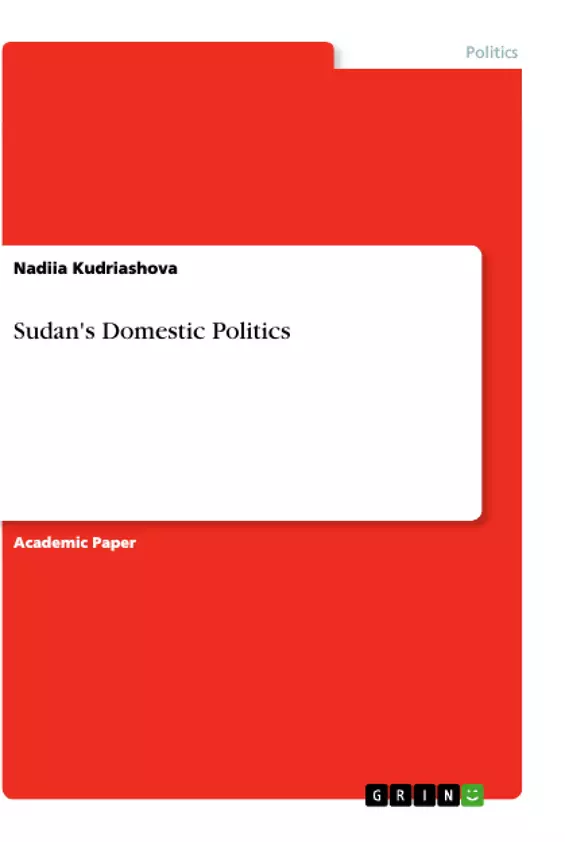Radical changes in the world in the late 20th century to a large extent reflected in the political process in African countries. This process – is the ambiguous, contradictory, very diverse in methods, content and results depending on sociohistorical specificity of a particular country. Geographical, historical, cultural and ethnic diversity of the African continent defined the specificity of the political development of the individual states.
The African continent presents a unique opportunity to trace the variety of ways of the development of states, as they are characterized by diversity of the specific historical conditions, different level of socio-economic and geo-political evolution.
Sudan, belonging to three regions - the Arab world, North-East and sub-Saharan Africa - makes it possible to identify both general and specific features of the political development. This factor gives the study the relevance, as well as scientific and practical significance.
Inhaltsverzeichnis (Table of Contents)
- Introduction
- Political Development in Sudan
- The Colonial Period
- Post-Independence Period
- Features of Political Development in Sudan
Zielsetzung und Themenschwerpunkte (Objectives and Key Themes)
This text explores the political development of Sudan, examining its historical trajectory from the colonial period to the present day. It aims to understand the factors that have shaped Sudan's political landscape, including the complex interplay of socio-economic, ethnic, religious, and geopolitical forces.
- The impact of colonialism on Sudan's political and economic development
- The relationship between the North and South Sudan, including its historical roots and ongoing challenges
- The role of military regimes in Sudan's political history
- The influence of Islamic political movements in shaping Sudan's political trajectory
- The challenges posed by ethnic and religious diversity in Sudan
Zusammenfassung der Kapitel (Chapter Summaries)
The introduction provides an overview of Sudan's geographical and historical context, highlighting its unique position at the crossroads of the Arab world, North-East Africa, and sub-Saharan Africa. It also introduces key challenges facing Sudan, including its poverty and ethnic diversity.
The chapter on Sudan's political development focuses on the colonial period and its lasting impact on the country. It examines the historical roots of the North-South divide, highlighting the unequal levels of development and discriminatory policies implemented by the colonial administration. The chapter further discusses the relationship between the North and South after independence, highlighting the persistence of these historical challenges.
The chapter exploring features of political development in Sudan analyzes the cyclical nature of military and civilian rule since independence. It examines the factors contributing to this pattern, including socioeconomic disparities, the struggle for power among political parties, and the destabilizing influence of ethnic and religious diversity. The chapter also discusses the role of Islamic political movements and their impact on Sudan's political landscape.
Schlüsselwörter (Keywords)
Key concepts and themes explored in the text include colonial legacy, North-South divide, political instability, military regimes, Islamic political movements, ethnic diversity, socio-economic development, and the challenges facing Sudan's political trajectory.
Frequently Asked Questions: Sudan's Politics
What are the main factors shaping Sudan's political landscape?
Sudan's politics are shaped by a complex interplay of socio-economic factors, ethnic and religious diversity, and its unique geographical position bridging the Arab world and sub-Saharan Africa.
How did colonialism impact the North-South divide in Sudan?
The colonial administration implemented discriminatory policies and unequal development strategies, which laid the historical roots for the long-standing conflict and divide between North and South Sudan.
What role have military regimes played in Sudan's history?
Sudan's political history is characterized by a cyclical pattern of shifting between military and civilian rule, often driven by political instability and socio-economic disparities.
What is the influence of Islamic political movements in Sudan?
Islamic political movements have been a significant force in shaping Sudan's trajectory, influencing legislation, governance, and the country's social fabric over several decades.
Why is Sudan considered a unique case for political study in Africa?
Due to its ethnic and cultural diversity and its membership in three distinct regions (Arab, North-East, and sub-Saharan Africa), Sudan reflects both general African political trends and very specific local features.
- Citar trabajo
- Nadiia Kudriashova (Autor), 2017, Sudan's Domestic Politics, Múnich, GRIN Verlag, https://www.grin.com/document/500557



